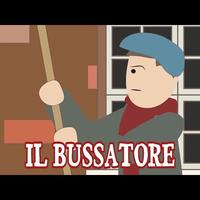I mestieri più strani della STORIA: il BUSSATORE, la sveglia umana
|Berufe||||||Weckermacher|||
|professions||||||knocker||alarm|human
Die seltsamsten Berufe der Geschichte: der COMPASSER, der menschliche Wecker
HISTORY'S weirdest professions: the COMPASSER, the human alarm clock
LAS PROFESIONES MÁS EXTRAÑAS DE LA HISTORIA: el COMPASSER, el despertador humano
歴史上最も奇妙な職業:コンパッサー、人間目覚まし時計
Najdziwniejsze zawody w historii: KOMPASER, ludzki budzik
As profissões mais estranhas da história: o COMPASSER, o despertador humano
HISTORIENS märkligaste yrken: KOMPASSERAREN, den mänskliga väckarklockan
Il bussatore - la sveglia umana I mestieri più strani della storia.
|Klopfer|||||||||
|knocker|||||trades||||
|portero|||||||||
|batedor de porta|||||||||
The knocker - the human alarm clock The strangest crafts in history.
Prima della diffusione delle economiche e affidabili sveglie, ci si affidava al bussatore
||Verbreitung||||zuverlässigen|Wecker|||||Wecker
||widespread||||reliable|alarms|||relied||knocker
||||||reliáveis|despertadores|||confiava||
Before the spread of cheap and reliable alarm clocks, we relied on the knocker
per svegliarsi.
Egli faceva da sveglia umana e bussava alla finestra dei lavoratore fino a svegliarlo.
he|he made||alarm|||knocked||||worker|until||wake him
||||||batia|||||||o acordava
He acted as a human alarm clock and knocked on the worker's window until he woke up.
Per via delle esigenze dell'industrializzazione, nel diciannovesimo secolo, potevano iniziare
|||Bedürfnisse||||||
|||demands|of industrialization||19th||they could|
Because of the demands of industrialization, in the nineteenth century, they could begin
a svegliare le persone già dalle 3 del mattino.
L'attrezzo da loro utilizzato era un lungo e spesso bastone in bambù, con una parte
Das Werkzeug|||||||||Stock||Bambusstock|||
The tool|||||||||stick||bamboo|||
ferramenta||||||||||||||
The tool they used was a long, thick bamboo stick, with one side
in metallo o una piccola manopola posta all'estremità.
|||||Knopf||
|||||knob||at the end
|||||perilla||
metal or a small knob placed on the end.
Il bussatore poteva anche impiegare il bastone come spegni candele, per smorzare i lampioni
||||||||Löscher für|||||
||||use||||candle snuffer|candles||extinguish||streetlights
|||||||||||apagar||
The knocker could also employ the stick as a candle extinguisher, to dampen the streetlights
a gas.
Avrebbero anche impiegato una cerbottana per sparare sassolini alla finestra degli inquilini.
||||Blasrohr||schießen|Steine||||
||||blowgun||shoot|pebbles||||tenants
|||||||piedras||||
||||bexiga de sopro||atirar|pedrinhas||||
They also allegedly employed a blowgun to shoot pebbles at the tenants' windows.
Il motivo per cui battevano direttamente sulla finestra della camera del lavoratore era perché
||||they were beating|||||||||
The reason they were beating directly on the window of the worker's room was because
bussare alla porta avrebbe svegliato ogni singola persona all'interno.
knock||door|would have|woken||single||
knocking on the door would have woken up every single person inside.
Per questo lavoro il cliente pagava il bussatore con qualche penny a settimana, e se non lo
|||||paid|||||penny||||||
||||||||||moeda pequena||||||
For this work the client paid the busser a few pence a week, and if he did not
avessero pagato sarebbero stati lasciati a sonnecchiare, perdendo così il lavoro.
||||||schlummern||||
||would have||left||doze|losing|so||
||||||sonar||||
||||||dormir||||
had paid would have been left to snooze, thus losing their jobs.
Tale mansione era principalmente svolta da uomini e donne anziane.
|Aufgabe||||||||
|role||||||||elderly
|tarea||||||||
This task was mainly performed by elderly men and women.
Durante la Rivoluzione industriale il bussatore era un lavoro apprezzato.
|||||Klopfmaschine||||geschätzte Arbeit
|||||knocker||||appreciated
During the Industrial Revolution, the busser was a valued job.
I loro clienti erano spesso persone che lavoravano nelle fabbriche.
|||||||they worked||factories
Their clients were often people who worked in factories.
Queste fabbriche avevano regole con orari rigorosi e se un lavoratore fosse arrivato
|||||Zeitpläne|||||||
|||||schedules|rigorous||||worker||
These factories had rules with strict schedules, and if a worker came in.
in ritardo avrebbe potuto essere multato o addirittura chiuso fuori e non essere pagato
|||||verwarnt||sogar||||||
|||||fined||even|closed|out||||
late he could have been fined or even locked out and not paid
per la giornata.
||day
for the day.
Se la cosa si fosse ripetuta, poteva concludersi col licenziamento.
|||||||enden||
|||||||end||dismissal
If this was repeated, it could end in dismissal.
La mansione del bussatore è nata dopo la rivoluzione industriale, nel 19 ° secolo,
|occupation|||||after||||in the|
The job of the knocker was born after the industrial revolution, in the 19th century,
e mostra come i lavoratori dovevano essere puntuali e come gli orari fossero diventati
|||||had to||punctual||||schedules|were|become
and shows how workers had to be punctual and how schedules had become
più rigorosi.
|more rigorous
more rigorous.
Sorprendentemente questo lavoro continuò ad esistere in alcuni posti fino al 20 ° secolo
surprisingly|this||||to exist||some|places|||
Surprisingly, this work continued to exist in some places until the 20th century
e non oltre gli anni '70. ma con l'invenzione della sveglia, tale impiego
|||||||||Wecker||
||beyond|||||||alarm||employment
and no later than the 1970s. but with the invention of the alarm clock, such use
si perse col tempo.
|verloren||
|she lost|with|
war in der Zeit verloren.
Was lost over time.
Dai un'occhiata al video sulla Rivoluzione industriale, e iscriviti per non perderti
|a look||||||||to||miss
Check out the Industrial Revolution video, and subscribe so you don't miss out
i prossimi episodi di Storici Subito - la storia non è mai stata così semplice.
upcoming episodes of Historians Now - history has never been easier.

